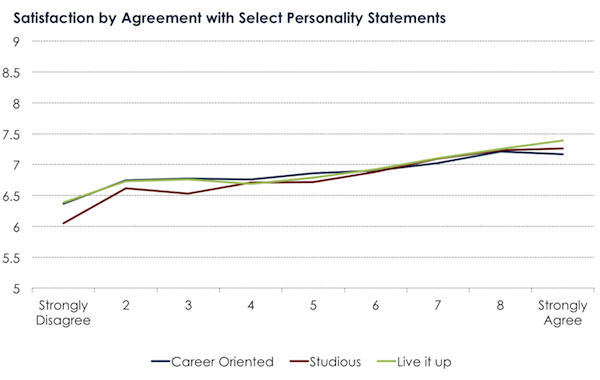Last week in our series on student satisfaction (and Toronto students’ lack thereof) we looked at how students’ perception of institutional character – specifically, things like having applied curricula, seeming open to new ideas and offering a supportive environment – correlated with student satisfaction. This week, we’re still on the issue of character, but students’ own characters rather than those of their institutions.
The 2012 Canadian University Report survey asked students how much they agreed, on a one to nine scale, with a series of statements about themselves (e.g. “I am an athlete”). There were eight statements in total, corresponding to “athlete,” “political junkie,” “environmental activist,” “artist,” “technological guru,” “career oriented,” “studious” and “I like to live it up.” (We were unable to ask the more direct question – whether or not students would describe themselves as “liking to party” – because no institution wants to be labelled a “party school” as a result of the CUR).
It turns out that only three of these eight statements have any important relationship to overall satisfaction (Figure 1). The ultimate trifecta of satisfaction? A studious, career oriented student who likes to live it up; the average satisfaction of a student who rates themselves as a nine on all of these measures is 7.5 out of nine.

This, by the way, makes you wonder why any institution would want to avoid being called a party school since such a status is likely to be associated with high levels of satisfaction. To at least some extent, the University of Western Ontario’s continued long-term success in having top satisfaction ratings (which it likes to talk about) is because of its status as a party school (which it would prefer not to talk about). It’s two sides of the same coin.
But back to our longer-term question: does any of this explain why Toronto students are so miserable? Can Toronto institutions’ low satisfaction levels be explained because students there are less likely to describe themselves as “career oriented,” “studious” or “liking to live it up”? Well, maybe a little bit.
Figure 2 shows the percentage of students who rate themselves as an eight or a nine (on a nine-point scale) on each of these three traits. Clearly, Toronto students are less likely to strongly identify with these three traits, but the gap isn’t huge – certainly not enough to explain the big gaps in satisfaction we see each year. That said, it’s worth noting that students at Ryerson – the one Toronto school that does reasonably well on the CUR’s satisfaction measure – are also the ones with the highest average scores for being career oriented and “liking to live it up” and the second-highest average scores for studiousness (behind OCAD).
More next week. Stay tuned.
— Alex Usher and Jason Rogers


 Tweet this post
Tweet this post

If there is ever a research audit of student satisfaction data, it might start with ‘what is student satisfaction anyhow’ and end with ‘why are we trying measure something so confounded by external factors”. No control, no conclusion as we said in grad school. Toronto in general, given it’s population and density is an alienating place with traffic and line ups to drag down the usual college spirit we see in most of our entering students.